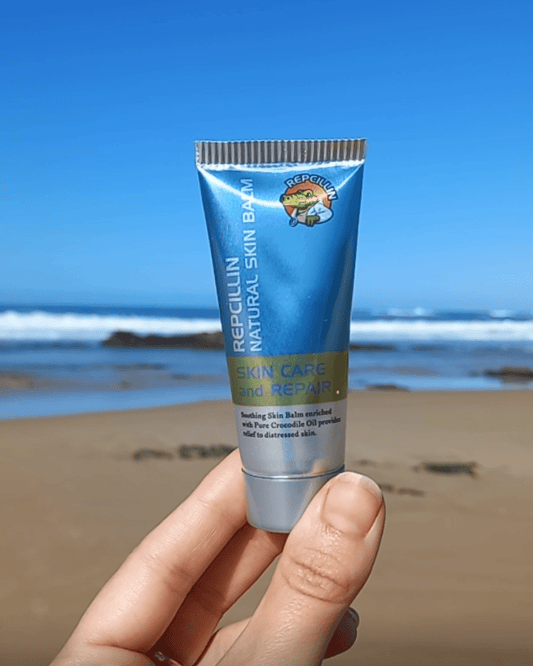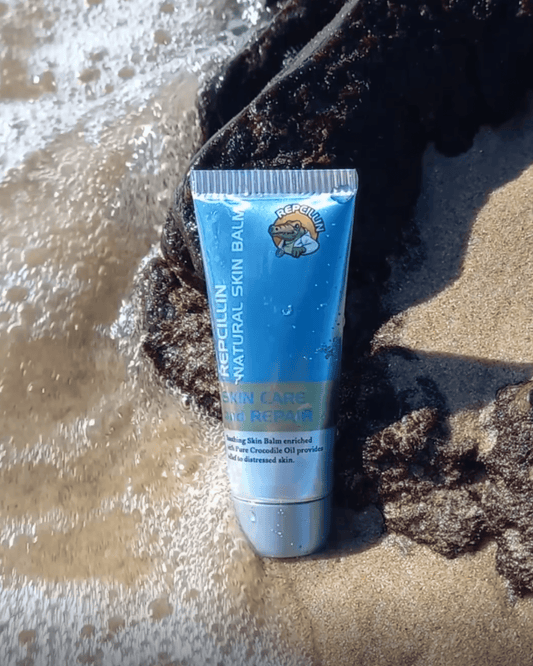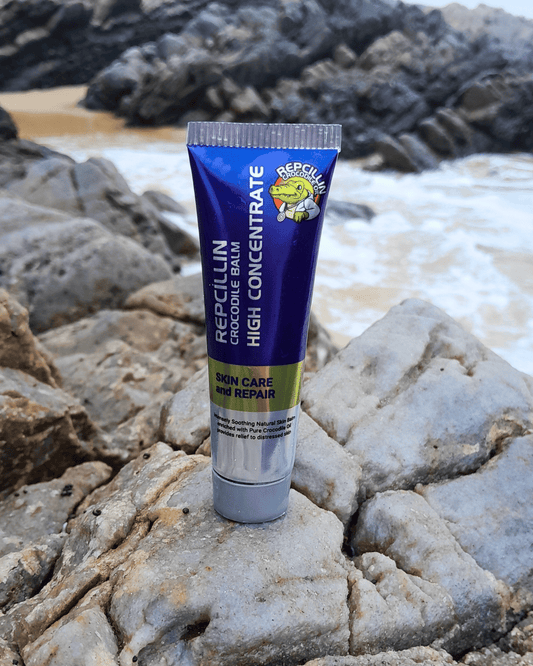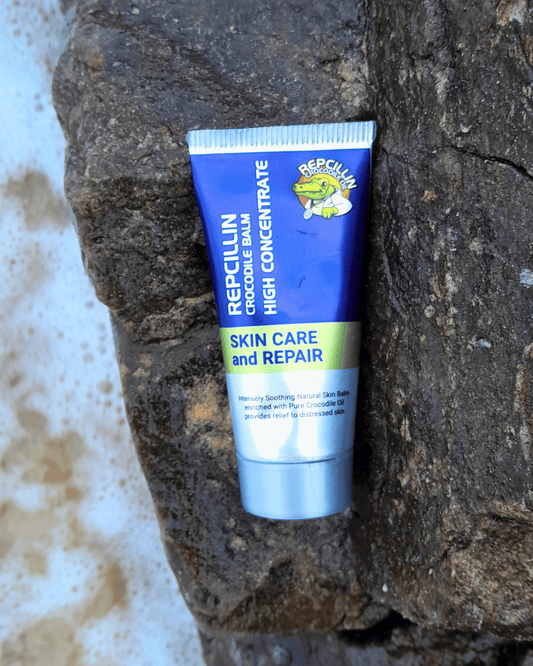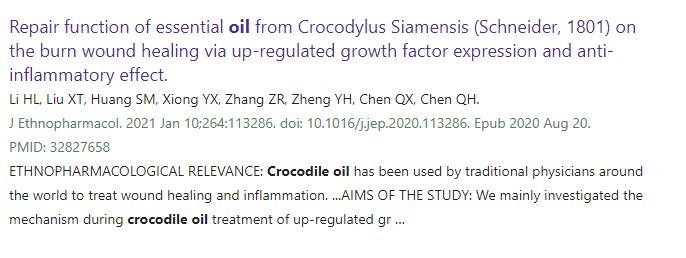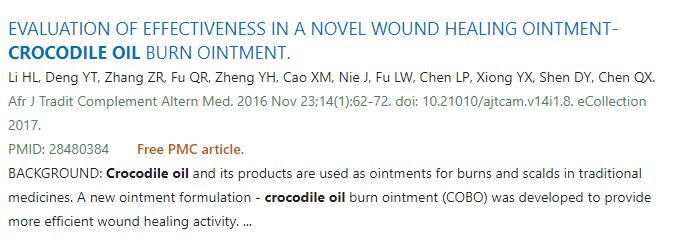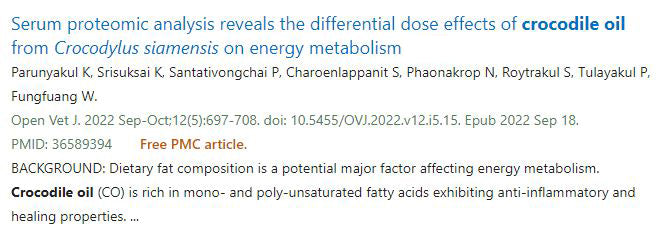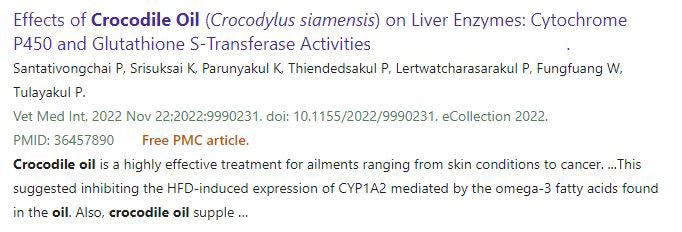Repcillin Crocodile Oil properties:
Numerous scientific studies from independently researched published reports
have proven the following benefits of Nile Crocodile Oil:
Anti-inflammatory:
Great for reducing swelling and pain, with effects comparable to ibuprofen;
Bacteriostatic:
Able to stop bacteria from spreading;
Hypoallergenic:
Safe for sensitive skin and doesn't cause irritation or side effects
Highly penetrating:
Light and quick to absorb into the skin, without a greasy feel
Non-comedogenic, does not clog pores.
Nile Crocodile Oil naturally contains:
Vitamin E:
Which helps heal and protect the skin and is a major antioxidant
Vitamin A:
Which repairs and defends the skin
Linoleic acid:
Which helps ease muscle and joint discomfort
Oleic acid:
Which renews skin cells and reduces wrinkles
Sapogens:
Which help soften the skin
Terpines:
Which act as antiseptics
Repcillin Crocodile Oil
Did you know When you blend Nile Crocodile Oil with other nature's goodies,
you get a skincare superstar that can tackle a whole bunch of skin issues.
Our products have come to the rescue for everything from acne to eczema,
from razor bumps to bed sores.
Whether it's skin discolouration, dark circles under your eyes,
minor burns, or even dry, flaky skin, our oil has you covered.
Got a case of bar rot or nappy rash? We're on it.
Abrasions and scrapes, athlete's foot, itchy scalp or psoriasis?
Yep, we can help with those too.
Sunburn, skin allergies, blisters, insect bites, thrush, warts and ulcers don't stand a chance.
So why not give our all-natural skincare solution a go?
You might just be surprised!
Repcillin is Ethical & Sustainable
At Repcillin, we believe in the power of nature to heal and rejuvenate the skin,
and we are committed to preserving the environment and its creatures.
That's why we never kill crocodiles for our skin products.
We source the crocodile oil that is used in our products as a by-product of the farming industry, which is regulated by strict guidelines.
We take our responsibility to the environment and its inhabitants very seriously,
which is why we are proud to be registered with the European Cosmetics Association.
This organization is dedicated to ensuring that all cosmetics are produced without cruelty to animals, and their strict standards help to ensure that our products are not only effective, but also ethically responsible.
We are proud to be part of this movement towards a more sustainable
and compassionate future for the health care industry.
Healed by a Crocodile: the Search for New Antibiotics: Monique van Hoek at TED Talk
Crocodile Oil Products
-
15ml Repcillin Original Balm
Regular price R 255.00Regular price -
50ml Repcillin Original Balm
Regular price R 600.00Regular price -
30ml High Concentrate Repcillin
Regular price R 541.00Regular price -
50ml High Concentrate Repcillin
Regular price R 875.00Regular price
Repcillin: Embracing Sustainability and Conservation
We believe that sustainability and conservation must always be at the forefront of our brand, even though our products come from an animal source.
As demand for cruelty-free and vegan beauty products continues to grow, we understand that our star ingredient may be a concern for some consumers.
However, we assure you that our company places a high priority on sustainability and conservation, and as members of the Convention on International Trade in Endangered Species, we must adhere to strict regulations when it comes to using crocodile oil.
Crocodile oil is a potent source of Omega 3, 6, 9 and 7, which we call the “rare beauty Omega”.
It also contains natural anti-microbial peptides, which allow wild crocodiles to heal their skin quickly in dirty environments.
We preserve its natural goodness, while maintaining its wound-healing attributes.
Discover the Power of Repcillin: Scientifically Tested and Respected
We are proud to be a scientifically tested and well-respected brand.
Our products have been subjected to rigorous testing to ensure their efficacy and safety, and our commitment to sustainability and conservation has earned us recognition and respect among consumers and industry experts alike.
We are confident in the quality of our products and stand behind the science that supports their effectiveness.
The amazing healing properties of Crocodile Oil have been well documented,
with numerous independantly researched published reports
available to view in the National Library of Medicines:
